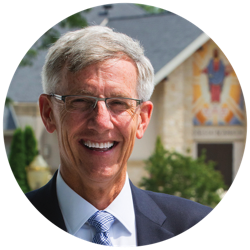While we understand (although some will not admit) that “Christmas” on our calendar is an officially recognized Christian holiday in the United States, we don’t often recognize that New Years Day is also a Christian holiday, of sorts, and shares a similar trait to Catholic higher education.
In the Catholic faith tradition, January 1st is a Holy Day of Obligation as we celebrate Mary as the Mother of God.
But for all of us … with or without a faith tradition … we “mark” January 1st as the turning point in another year since the coming of Christ.
Think about that for a moment.
Nearly the entire world accepts that today marks January 1, 2016, A.D., in which A.D. 2016 means “Anno Domini” and translates to “the Year of Our Lord.” This, of course, refers to the 2,016 years since the birth of Jesus Christ. His birth reflects the transition from those “B.C.” or “Before Christ” years. Thus, we find that today the world acknowledges Christ’s arrival as the dividing point–or center–of human history. The axis mundi.
This is the reference point in daily life for nearly all 7.4 billion people in the world.
Just as Christ serves as the center of history, so He serves as the center of the Catholic higher education experience. It was the Catholic Church that established those very first universities. Why? So as to protect, transmit, and generate knowledge because it has been well understood for thousands of years that if one rises to higher levels of learning then one moves closer to the Transcendent One … the author of life and all that surrounds us in nature. To grow in wisdom of the created is to grow in love for the Creator.
The Catholic higher education experience understands that one’s intellectual, spiritual, physical, emotional, and social development all work together to serve one’s purpose in life … to raise you up to a life of fulfillment and place you on a path to true happiness. An attempt to isolate, eliminate, or even disentangle these necessary aspects of whole-person human development is an infringement on the needs of students. How can an institution assert to be “student centered” if it fails to recognize student needs … all student needs?
Reflect for a moment on history. Consider the availability of a college education on a scale like we experience today. Think about all those the world has ever seen … and then how few have had the privilege to obtain an elementary or secondary education let alone a higher education. It simply was not possible … a mind-boggling thought. Education has never been available on a scale seen today.
And against that backdrop, it has only been in recent years that many institutions of higher education have “walked away” from educating the whole person. Some focus on athletics. Some focus on career training. Some focus on academics. Many of these neglect “giving back” or offering service opportunities. Many ignore ethics and morality. Very few even attempt to integrate the higher education experience across academic subjects let alone across student life and the wide variety of campus activities.
A Catholic education, however, does focus on all of these … and so much more.
Perhaps this, then, becomes the central question: Is the educational approach that has been developed, refined, and imitated for over 900 years more or less valuable than one created in modern times?
In your search, it would not be unfair for you to insist on higher education that actually elevates you to a higher level. You should ask the institution(s) you are considering to show you, by way of examples, how they are offering a focus on the whole-person for their students.
We know from 900 years of practice that a college or university that celebrates, in the words of Cardinal Ratzinger, Christ as “the point of reference …. the rising sun of history” will focus the educational experience on the whole-person of the student … something to think about on a day when the world tacitly acknowledges Christ as the axis mundi of our human history.

